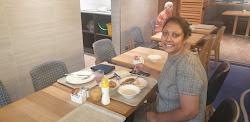Comfort eating is an addiction.
Society doesn’t recognise comfort eating as an addiction or part of mental health. I believe it is the reason why I do it. My negative relationship with food started when Arvind died. He died because he couldn’t eat physically, and due to medical negligence of not being fitted with a feeding PEG, he starved. He loved his food too. I hated seeing food because it was the ‘killer’. I was so angry that what he loved so much killed him.
Initially I started to comfort-eat because I wanted to put on so much weight; I thought I could eat myself to death. (I had been slim most of my life up until that point.)
When that failed it became a comfort to my grief. I felt good in that particular moment as I ate, but then worse afterwards when I finished eating that 150g Kettle crisps bag, as I felt so fat and low, so it’s a vicious circle! But I couldn’t stop no matter how hard I tried.
Many times, I was told it’s willpower and to just stop eating it. If only it was that simple. Do you really think most people who are overweight like being that size when society is constantly judging them? For example, when you are in a restaurant and you are faced with the eyes of people looking and thinking, ‘why are they eating that pudding, no wonder they are fat’. Or when you are asking for an XXL size when you shop for clothes. Or when you are profusely sweating away and people associate your fatness with it. I tried many times to stop the comfort eating but it made me feel worse when I failed as it made me low when I couldn’t stick to the ‘plan’. I would reach for the junk food to make me feel better, which in turn made me feel worse afterwards and I would think, ‘what’s the point?’
Comfort eating is an addiction, just like taking drugs or drinking alcohol. You can’t just stop. I eat my feelings. I knew that mentally I had to be in a good place in order to stop. Food for me was an extrinsic motivation (reward-driven behaviour) and so I needed the right mindset for the intrinsic motivation to kick in. And then COVID happened, and it gave me the head space to grieve and cope with daily life and so I wasn’t reaching for that big bag of crisps (maybe a small bowlful instead), which was a massive step in the right direction and slowly, slowly I stopped relying on the comfort food. Don’t get me wrong - some days I do eat that 150g of Kettle crisps.
Yet, there’s the other side. Society assumes people who are slim are happy. Now I’ve lost the weight, I see the different assumptions. When I finally stepped outside again to pick up a few groceries from our local supermarket, after shielding ended, staff who knew me asked if I had been ill. When I asked why, the reply was I had lost so much weight. When I went to the restaurant and ordered my mains, the waiter said, ‘you would like boiled potatoes with that ma’am, wouldn’t you?’ (instead of chips).
Then there was a recent hospital visit and the doctor assumed I was anaemic. I was like if I am anaemic, then there is something definitely wrong!
I know I’m also going to be called that bitch, the one who can eat anything and ‘get’ away with it, but they don’t know what I know and how hard I’ve had to work to get here and tomorrow I could put it all back on as there’s no magic wand – I will always have that negative relationship with food because my grief will always be there as my love for my brother will be there till the day I die.
So, whether a person in YOUR eyes seems too ‘large’ or too ‘slim’, remember there could be reasons why: a medical reason, good metabolism, genes, mental health, so think before you speak as those judgemental comments hurt and can pull someone down.
 |
| This is how I looked before my weight loss. |
 |
| This is me now. |


Comments
Post a Comment